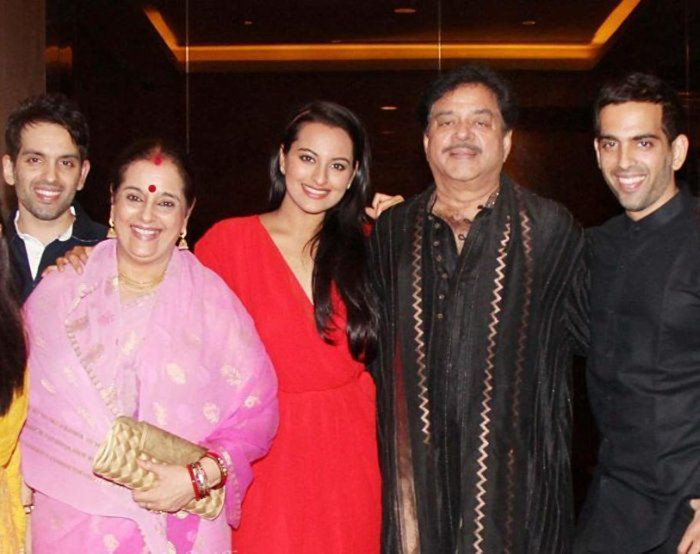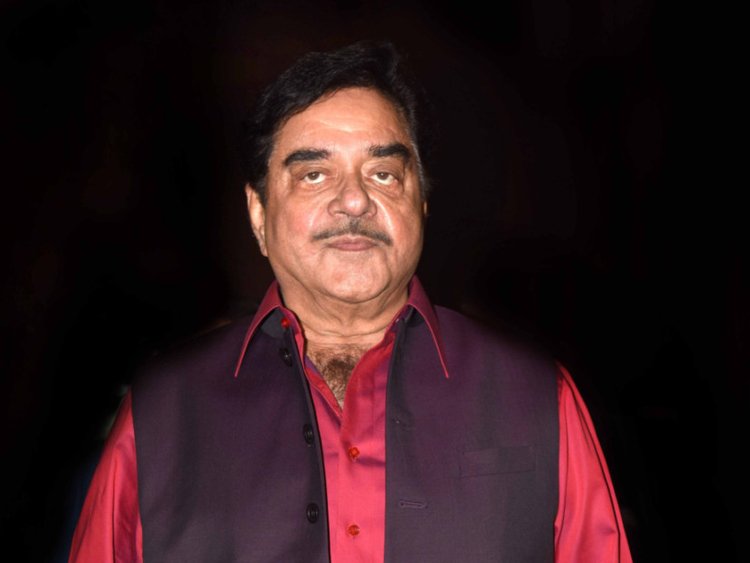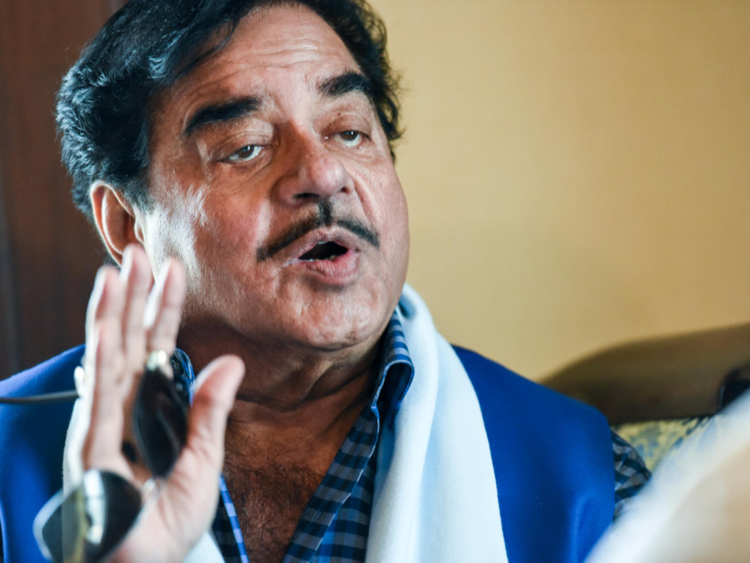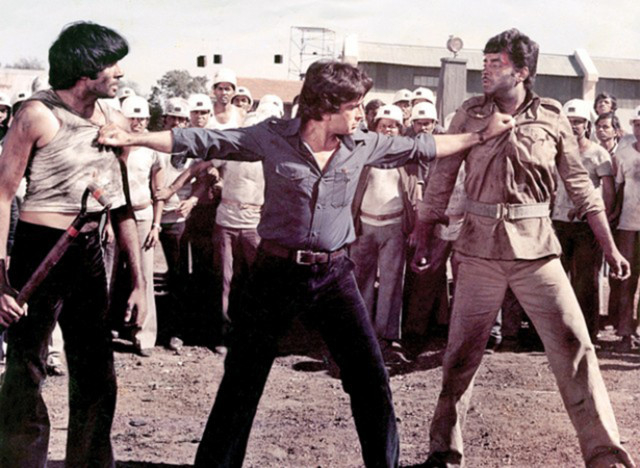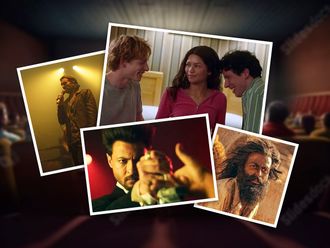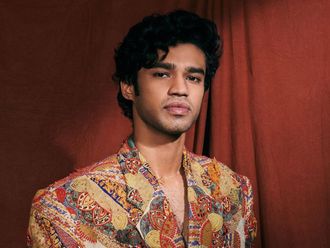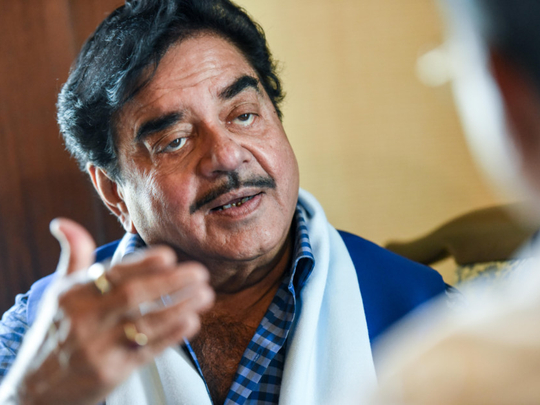
“If a simpleton with a scar face like mine hailing from a small town in Bihar can become a leading star in Bollywood, then anyone can — with determination and dedication,” Shatrughan Sinha, recipient of Filmfare’s Lifetime Achievement Award for his contribution to Indian cinema, tells tabloid in an exclusive interview.
His celluloid mannerisms are said to be inimitable but one of India’s famous actors has ridden to mass adulation copying them to great effect. Tamil cinema’s superstar Rajinikanth employed Sinha’s mannerisms to such great effect that he was called South India’s Shatrughan Sinha while Telugu cinema’s iconic Chiranjeevi claims he chose to be an actor solely inspired by Sinha’s movies.
My rendezvous with Sinha was arranged on the 24th floor of Dusit Thani Hotel overlooking the busy Shaikh Zayed Road and the beautiful buildings in the background could well have been a frame out of a Bollywood movie.
As I speak to the star I have admired the most and whose films I have loved watching since my school days, I find it easy to understand what being awestruck is like.
For fans of Sinha, much of his charisma lies in his powerful dialogue delivery. Who can forget such streaks of thunder as ‘Jali ko aag kehte hain, bhuji ko raakh; jis raakh se barood bane usse Vishwanth kehte hain’ (That which burns is fire; that which extinguishes is ashes; and the ashes that make a dynamite is known as Vishwanath) from his 1978 blockbuster movie, Vishwanath.
“Those days, heroes had names that rolled off the tongue with ease with suffixes of Kumar, such as Dilip Kumar, Ashok Kumar, Rajendra Kumar and Raj Kumar. And I had a tongue twister of a name: Shatrughna Prasad Sinha,” says Sinha, his voice as attention-grabbing as ever. But before he got too tempted to go the Kumar way, he received priceless advice from a leading director of the times. “The great director Mani Kaul told me to not change my name. He said, ‘Agar kaam chalega, toh naam chalega’ (If your work succeeds, your name will too). So I dropped [my middle name] Prasad and changed my name from Shatrughna to Shatrughan to make it easier to pronounce.”
It’s a testimony to his star power that his name lent itself to one of the most machismo-fuelled nicknames in Bollywood. “The famous journalist/writer Shobaa De called me ‘Shotgun’”, Sinha recalls.
The actor-turned-politician, whose 2016 biography Anything But Khamosh (Anything But Silent) is a best-seller in India, was in Dubai to attend a health conference and a function arranged at Dusit Thani to felicitate him on receiving the prestigious ‘Indian Oscar’ — the Lifetime Achievement Award conferred on him by India’s leading film magazine, Filmfare. For Sinha, though the award has come very late in his career, he’s happy that it did.
“Many feel that if you get a Lifetime Achievement Award, it’s the end of your career, but I feel this is just the beginning of the beginning for me,” he says, with his characteristic display of confidence.
It’s this unmissable trait that took him to the Pune Film Institute, India’s premier film institute, in pursuit of a career in acting. His father wanted two of his four sons to become scientists and the other two doctors. While his siblings have lived up to their father’s wishes, Sinha chose a different path.
“I was unfit to become even a compounder so how could I become a doctor?” he confesses.
After graduating from the institute (now renamed the FTII), he picked up small roles, including that of a villain in Prem Pujari in 1970. And the very next year, 1971, destiny beamed at him. He played the lead role of an unemployed, disenchanted youth in Gulzar’s Mere Apne (My Own), and there was no looking back for Sinha. Since then, he has acted in more than 250 films.
He is also the first Indian film star to directly become a minister of cabinet rank in the then NDA government headed by BJP’s Atal Bihari Vajpayee and had held the Health and Family Welfare and later the Shipping portfolios. Though bitter about being excluded from current Prime Minster Narendra Modi’s ministerial cabinet and from campaigning for the recent elections in Bihar and Uttar Pradesh, Sinha however believes that Modi is a “dashing, dynamic, action hero”.
Excerpts from the interview:
On receiving Filmfare and IIFA Awards:
I don’t give much importance to film awards nor have I lobbied to get them. I am not complaining, but politics and lobbying are involved in this. People like us are above all these things. Today my policy is ‘no demand, no command, no complaints and no expectation’.
I don’t say lobbying happens in all awards, there are several that are genuine, too. Be it State film awards or National film awards, controversies arise sometimes — some are true some are not.
The Filmfare Award has come after it has eluded me all these decades. But I consider this as just the beginning of the beginning and not an end in itself. I feel it as a responsibility to do more to the society.
I am happy that Akshay Kumar has received the award for best actor for his portrayal in Rustom. On the other hand, Aamir Khan has done excellent films and he has not been rewarded.
I have done more than 250 films and have been a cabinet minister and one of the so-called successful, most prominent and perhaps the most respected actors. Yet I have not been invited to the Dubai Film Festival as chief guest, let alone as a cheap guest (laughs).
On entering politics:
“I entered politics at the height of success as an actor. I have no political background just as I had no connection with films until I was encouraged by my friends and lectures to join the film institute. I entered politics at L.K. Advani’s behest. I consider him my friend, philosopher, guru and ultimate leader. I was made to contest against Rajesh Khanna in a by-election and I lost. There was a misunderstanding between us and Rajesh Khanna stopped talking to me, though being a good friend of mine. I tried to put across the idea that I was fighting against the party [Congress] and not against him. But I am glad that I could apologise to him before he passed away. I sincerely believe he has pardoned me.
Besides being an actor and a politician, I am a gentleman — because politics and gentlemen don’t go together. Fortunately, in films and politics there have been no allegations of any sorts against me.”
Rivalries in Bollywood:
“There are many. Subhash Ghai is still a close friend and I have mentioned about him in my biography Anything But Khamosh. There were some misunderstandings between Amitabh Bachchan and me. But I hold him in highest regard. Besides being my oldest and dearest co-star, I don’t think anyone has the most-admired personality than him. Perhaps he was not so much dear to me earlier. Jawani mein bahut kuch hota hai — utaar, chadaav [there’s plenty that happens in one’s youth — ups and downs] but over time, we also became mature.”
On doing new films:
“Even [my daughter] Sonakshi tells me to act. If I get a good role, I might consider. Otherwise, how long will I be mouthing the same dialogue, ‘Agar hilne ki koshish kare tho goli maar doonga’ (If you move, I will shoot you’). If there’s an exciting role, which only Shatrughan Sinha can portray, then I may accept it. I have nothing more to prove. Most of my movies have been blockbusters. I acted in Madhur Bhandarkar’s Aan: Men at Work along with Akshay Kumar and Paresh Rawal while being a minister with Atal ji’s permission.”
On the current generation of actors:
“Akshay Kumar is a very good actor. Even Salman Khan is a nice actor. I liked his recent film, Sultan. Another actor who is dear to me is Aamir Khan. I am very proud and fond of him. His Dangal is all about women empowerment. He’s done it with great commitment and passion and it shows in the film. It’s a really good, commercial film. I consider him in the class of Bimal Roy, Dulal Guha, Guru Dutt or K Asif in his commitment. Josh aur hosh jab milkar saamne aata hai tho kamaal ho jaata hai — bemisaal hota hai! During our time josh se zyada hosh pe gaur karte the!!
On why we get to see fewer multi-starrer films now:
“There was no insecurity then. When we were doing films, our confidence was at a different level. Even our personalities were at a different level. You can’t find personalities like Vinod Khanna, Amitabh Bachchan, Dharmendra and Shatru these days. They [the younger stars] have the body but not the personality. Yesteryears stars made a huge impact, that is lacking now. Even now, when people see us at an airport or in any public place, they still turn their heads to look at us.”
On his daughter Sonakshi (also an actor):
“Sonakshi has her mother’s beauty and father’s confidence. She is doing well and we pray that she does further good films. I’ve seen her Lootera. It left an impact on me. I liked her role in Akira, whatever its fate. Noor is a good film, too. God has been kind to her. Sonakshi was not initially interested in films. She has done a course in fashion designing. Salman Khan and his parents are our family friends. Salman came with a script for Sonakshi and convinced her to take up the role. She was presented in a decent manner.”
On his sons Luv and Kush:
“Luv had done Sadiyaan [Eons] in which Rishi Kapoor, Hema Malini and Rekha have acted. He is now doing a film which is being produced and directed by Kush.”
On his scar face (it’s rumoured that he got the scar on his face in a fight at the film institute):
“There are several rumours about this scar on my face. I don’t remember how I got it. Maybe I nicked myself while shaving at a young age. But it was definitely not at film institute, for my impact was such that I didn’t have to fight with anybody. They maintained a respectable distance since I also had leadership qualities and then I had this overbearing personality, strong voice and rough-hewn looks. One look and they would go cowering [laughs].”



